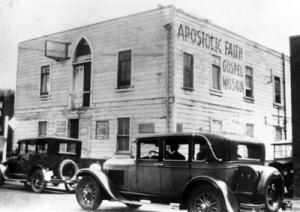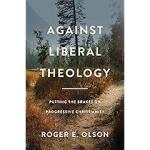Pentecostal versus Charismatic versus Prosperity Gospel
Yes, today these labels overlap. But that was not always the case. Here’s the story.
The modern Pentecostal movement in America was born in 1906 at the Azusa Street Revival near downtown Los Angeles. People spoke in tongues and some identified that as the “initial, physical evidence” of the “second blessing,” the “infilling of the Holy Spirit.” The movement then went on to birth numerous denominations including the Assemblies of God. The mostly Black Church of God in Christ already existed but became part of the new Pentecostal movement.
I was taught at a Pentecostal college that the Pentecostal movement “really” began on January 1, 1901 in Topeka, Kansas. Gradually, however, Pentecostal and other scholars shifted the story to 1906 Los Angeles. Why? A leader of the Topeka revival was reported to have been an abuser and a racist.
I have been Pentecostal. I grew up Pentecostal. In the “thick” of the movement in the 1950s and 1960s. My father was a Pentecostal minister. My uncle was president of our Pentecostal denomination. In high school I wrote a major research paper, much helped by my uncle, about Pentecostalism. I still have it.
Back then, the distinguishing doctrine of Pentecostalism, at least in America, was the doctrine that speaking in tongues is the “initial, physical evidence” of the “second blessing” after conversion called the “baptism of the Holy Spirit.”
We Pentecostals then would never have believed that one of us would someday be appointed head of a White House “Faith Office.” Only she is called “charismatic.” In my book, however, she is more Pentecostal. But read on.
Back then, Pentecostals were widely thought of by non-Pentecostals as “holy rollers” if not “snake handlers.” We were looked down on. We were, in the words of an author about us “the disinherited,” poor, ignorant, and marginal.
Then came the charismatic movement—in the early 1960s. One of us, an AG minister from South Africa named David du Plessis, reached out to Catholics and “mainline Protestants” with the message of the infilling of the Holy Spirit and speaking in tongues. An Episcopal minister named Dennis Bennet spoke in tongues and wrote a book about it. Suddenly, so it seemed, numerous Catholic and “mainline Protestants” were speaking in tongues. We Pentecostals didn’t know what to do since many of them drank alcohol and declined to join us. They stayed in their Catholic and Protestant churches.
I was “there” when this transition was happening. Suddenly, there were Lutheran and Episcopal and Presbyterian, to say nothing of Catholic, people speaking in tongues, passing us by entirely in the swell of this new charismatic movement. Few of them believed speaking in tongues was the initial evidence of the infilling of the Holy Spirit. A new theology of the Holy Spirit and speaking in tongues was rising and gaining momentum.
The church I grew up in decided to embrace charismatics as true brothers and sisters and many joined our Pentecostal church while retaining their membership in their non-Pentecostal churches. We didn’t mind at all. Some other Pentecostals did mind. David du Plessis was disciplined by his denomination for being ecumenical.
To make a long story short, gradually many classical Pentecostals adopted the label “charismatic” because it didn’t carry the social stigma that “Pentecostal” did and does. My home church became charismatic more than Pentecostal. We dropped the doctrine of speaking in tongues as initial physical evidence and accepted that people could be Spirit-filled but not yet speak in tongues.
The charismatic movement passed by classical Pentecostalism. Most charismatics probably knew almost nothing about Pentecostalism. They didn’t call themselves Pentecostal and didn’t adopt our fundamentalist approach to the Bible and legalistic lifestyle.
Then, in the 1980s, as never before, numerous “independent Pentecostal” evangelists and revivalists and “prosperity,” “health and wealth,” began to drop the label “Pentecostal” in favor of “charismatic” while remaining firmly rooted in Pentecostalism. Most of them left their Pentecostal denominations.
A case study in this transition was “healing evangelist” Oral Roberts who grew up in the Pentecostal Holiness Church but joined the United Methodist Church. He dropped the label “Pentecostal” and adopted “charismatic.” I was there as that was happening. A large Pentecostal church met on the campus of Oral Roberts University and called itself charismatic rather than Pentecostal. Within a few years numerous independent Pentecostal “prosperity gospel, “health and wealth, ministries adopted the label “charismatic.” Their ETHOS, however, remained Pentecostal even as they de-emphasized certain classical Pentecostal doctrines and lifestyles.
Most of these “charismatics” were and are far from the original charismatic movement of the 1960s and 1970s which was largely ecumenical with “mainline Protestants” and Roman Catholics worshiping together and speaking in tongues without any hint of a theology of prosperity or health through “Word-Faith” teachings or practices drawn largely from the New Thought Movement of the 19th and early 20th centuries.
Sometime in the 1990s the Pentecostal Fellowship of North America became The Pentecostal and Charismatic Churches of North America. It is a much broader coalition or fellowship of churches than was its predecessor the PFNA. It’s leadership, however, had remained classical Pentecostal but with a new “face,” open to non-Pentecostals who believe in the continuing importance of all the gifts of the Holy Spirit.
The original charismatic movement has by and large died out. Sure, there are still mainline Protestants and Roman Catholics who speak in tongues, but the movement as a whole has died out. Now it is pretty much impossible to distinguish between Pentecostals and charismatics in terms of labels. Many classical Pentecostal denominations, however, cling to their old distinctive doctrine of speaking in tongues as the initial, physical evidence of the infilling (or baptism) of the Holy Spirit.
My point is that when someone identifies as “charismatic” it’s very difficult to know how he or she relates to Pentecostalism. The Pentecostal movement is now mostly simply the collection of churches that hold onto the doctrine of speaking in tongues as the initial, physical evidence of the second blessing of being baptized (or filled) with the Holy Spirit. Even some Pentecostal denominations, however, have softened that doctrine quite a bit such that they believe anyone who IS filled with the Holy Spirit COULD speak in tongues whether they HAVE spoken in tongues or not (e.g., the late Billy Graham).
As someone who lived through the charismatic movement and served on the staff of a church that was post-Pentecostal becoming charismatic I chafe at ministers who are clearly rooted in Pentecostalism being labeled “charismatic.” To me, anyway, the whole “health and wealth” prosperity gospel of “Word of Faith” movement is foreign to the charismatic style. But it is also foreign to the Pentecostal style. To some sad extent, the ministers of that movement have taken over the label “charismatic” which is, to me, a shame. They have also largely taken over what is left of the Pentecostal movement, if anything, outside the Pentecostal denominations (e.g., the Assemblies of God).
What is Paula White? To me she doesn’t “look” or sound like either Pentecostal or charismatic although she is usually labeled “charismatic.” If I had my way, which I never will, I would have prosperity, health and wealth, “name it and claim it,” ministries drop either label, Pentecostal or charismatic, and just be called “Prosperity Gospel.” And I would have media talking heads and journalists do the same with them.
*Note: If you comment, make sure to keep it relatively brief (no more than 100 words), strictly on topic, addressed to me, civil and respectful (not hostile or argumentative), and devoid of pictures or links.*













